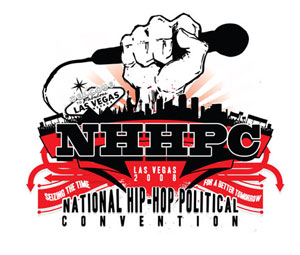CHARLENEM

LAS VEGAS (FinalCall.com) – Hundreds of hip hop activists, artists, youth, educators and journalists recently convened the Third Bi-Annual National Hip Hop Political Convention at the University of Las Vegas, Nevada where they presented a 2008 agenda filled with issues they say are glossed over in mainstream politics.
The organization formed in 2003 when members of the hip hop generation decided to flex their political and cultural power in politics. The conference’s purpose was two-fold: to underscore a successful stand against a 2006 attempt to ban hip hop here three years ago and update the National Hip Hop Political Agenda.
The conference theme was “Seizing the Time For A Better Tomorrow,” and the gathering featured panel discussions, workshops, training and entertainment around its six-point agenda. Agenda items include education, economic justice, criminal justice, health and wellness, human rights, and “womanism”–which seeks to end violence, sexism and misogyny against women.
The agenda in part calls for state and federal mandates for equal funding resources in education and parity spending in public schools; an end to gentrification and the destruction of publicly funded and affordable housing, and reparations for Indigenous peoples and victims/descendants of the African slave trade.
“The agenda are the issues that the political hip hop community identified as areas we need to address in this current period or are already working on. Unlike other political platforms, we take responsibility on these issues such as being responsible for our own health wellness, eating healthy and exercising, treating women with love and respect, [and] not supporting and staying critical of people in our communities and entertainers that objectify, disrespect and verbally, attack women,” said Jay Woodson, a convention organizer from Philadelphia.
According to Mr. Woodson, the convention did not engage either Sen. Barack Obama’s or Sen. John McCain’s presidential campaigns with its agenda, but both campaigns were invited to attend. The Obama campaign promised to send someone but no one showed up and the McCain campaign didn’t respond, he said.
Members of the Green Party USA and the Young Democrats did attend.
Rosa Clemente, the vice presidential candidate for the Green Party USA, encouraged voters to consider their interests, despite party affiliations and directed words particularly toward Black, older and Latino voters. “The Democratic Party has already said, and the presumptive nominee has already said that the embargo on Cuba has to stay; that Hugo Chavez is a dictator; that the FISA (Foreign Intelligence Surveillance Act) bill can be signed so Americans can now be legally spied on. They didn’t end the war. They took impeachment off the table. They don’t want a livable wage, they just want a minimum wage. All of those policies are diametrically opposed to everyday life in America,” Ms. Clemente said.
Ms. Clemente and T. J. Crawford, founding member of the hip hop convention from the Chicago Local Organizing Committee, moderated a Black and Brown Solidarity Luncheon. Other presenters discussed using hip hop inside and outside of classrooms, exposing the sexual politics of the hip hop generation, and post-Katrina realities in New Orleans and the Gulf South. Cynthia McKinney, the Green Party USA presidential candidate, closed the event with a keynote address.
Other speakers included Troy Nkrumah, the 2008 convention chair from the Las Vegas Local Organizing Committee; Mayaba Liebenthal of INCITE! Women of Color Against Violence and Critical Resistance; Robert “Kool Black” Horton of Critical Resistance and Black Men United; Rev. Lennox Yearwood, Hip Hop Caucus president; Dr. Mark Lamont Hill of Temple University, and Davey D, a writer and activist with Hardknock Radio.
The group’s next steps are to engage in local social justice campaigns, provide political education and get more young people engaged in politics and follow up with those who want to get involved, Mr. Woodson said.
“Hip hop is a powerful medium and the NHHPC uses that medium to reach people that wouldn’t ordinarily engage in politics.It is important for everyone, irregardless of their openness to electoral politics to join organizations–whether it’s struggling to end police assassinations, criminalizing the young generation, improving public education, ending the occupation in Iraq or increasing access to health care,” Mr. Woodson said.
The conference was held Aug. 1-3.












